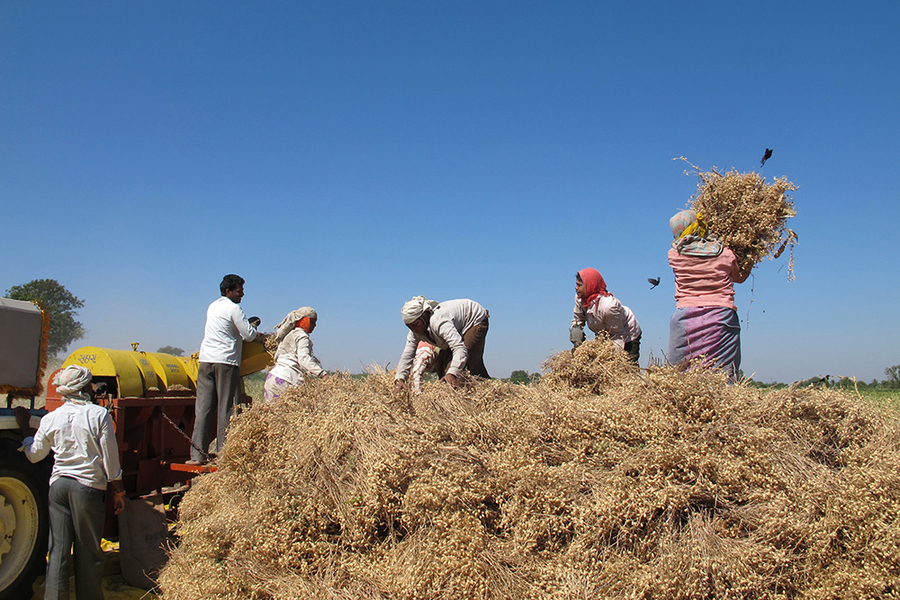PKG Fellowship and IDEAS Alum: Takachar featured in MIT News!
Takachar co-founder, Kevin Kung SM ’13, PhD ’17, received PKG Fellowship funding to begin this project. In addition, Takachar, was an IDEAS Social Innovation Challenge grantee in 2012 and received $5,000 in funding to implement their work.

To prepare fields for planting, farmers the world over often burn corn stalks, rice husks, hay, straw, and other waste left behind from the previous harvest. In many places, the practice creates huge seasonal clouds of smog, contributing to air pollution that kills 7 million people globally a year, according to the World Health Organization.
Annually, $120 billion worth of crop and forest residues are burned in the open worldwide — a major waste of resources in an energy-starved world, says Kevin Kung SM ’13, PhD ’17. Kung is working to transform this waste biomass into marketable products — and capitalize on a billion-dollar global market — through his MIT spinoff company, Takachar.
Founded in 2015, Takachar develops small-scale, low-cost, portable equipment to convert waste biomass into solid fuel using a variety of thermochemical treatments, including one known as oxygen-lean torrefaction. The technology emerged from Kung’s PhD project in the lab of Ahmed Ghoniem, the Ronald C. Crane (1972) Professor of Mechanical Engineering at MIT.
Biomass fuels, including wood, peat, and animal dung, are a major source of carbon emissions — but billions of people rely on such fuels for cooking, heating, and other household needs. “Currently, burning biomass generates 10 percent of the primary energy used worldwide, and the process is used largely in rural, energy-poor communities. We’re not going to change that overnight. There are places with no other sources of energy,” Ghoniem says.
What Takachar’s technology provides is a way to use biomass more cleanly and efficiently by concentrating the fuel and eliminating contaminants such as moisture and dirt, thus creating a “clean-burning” fuel — one that generates less smoke. “In rural communities where biomass is used extensively as a primary energy source, torrefaction will address air pollution head-on,” Ghoniem says.
Thermochemical treatment densifies biomass at elevated temperatures, converting plant materials that are typically loose, wet, and bulky into compact charcoal. Centralized processing plants exist, but collection and transportation present major barriers to utilization, Kung says. Takachar’s solution moves processing into the field: To date, Takachar has worked with about 5,500 farmers to process 9,000 metric tons of crops.
Takachar estimates its technology has the potential to reduce carbon dioxide equivalent emissions by gigatons per year at scale. (“Carbon dioxide equivalent” is a measure used to gauge global warming potential.) In recognition, in 2021 Takachar won the first-ever Earthshot Prize in the clean air category, a £1 million prize funded by Prince William and Princess Kate’s Royal Foundation.
Roots in Kenya
As Kung tells the story, Takachar emerged from a class project that took him to Kenya — which explains the company’s name, a combination of takataka, which mean “trash” in Swahili, and char, for the charcoal end product.
It was 2011, and Kung was at MIT as a biological engineering grad student focused on cancer research. But “MIT gives students big latitude for exploration, and I took courses outside my department,” he says. In spring 2011, he signed up for a class known as 15.966 (Global Health Delivery Lab) in the MIT Sloan School of Management. The class brought Kung to Kenya to work with a nongovernmental organization in Nairobi’s Kibera, the largest urban slum in Africa.
“We interviewed slum households for their views on health, and that’s when I noticed the charcoal problem,” Kung says. The problem, as Kung describes it, was that charcoal was everywhere in Kibera — piled up outside, traded by the road, and used as the primary fuel, even indoors. Its creation contributed to deforestation, and its smoke presented a serious health hazard.
Eager to address this challenge, Kung secured fellowship support from the MIT International Development Initiative and the Priscilla King Gray Public Service Center to conduct more research in Kenya. In 2012, he formed Takachar as a team and received seed money from the MIT IDEAS Global Challenge, MIT Legatum Center for Development and Entrepreneurship, and D-Lab to produce charcoal from household organic waste. (This work also led to a fertilizer company, Safi Organics, that Kung founded in 2016 with the help of MIT IDEAS. But that is another story.)
Click here to read the full article on MIT News
Last year, the PKG Center interviewed Kevin Kung SM ’13, PhD ’17 for the 20th anniversary of the IDEAS Social Innovation Challenge. Click here to read that interview and learn more about Takachar and its sister company, Safi Organics, also co-founded by Kung. In addition, you can read more about the earliest stages of these ventures through Kevin’s PKG Fellowship blog here.
Tags: Climate Change, IDEAS, IDEAS 2012, IDEAS Alumni Profiles, PKG Alumni, PKG Fellowships, Takachar
